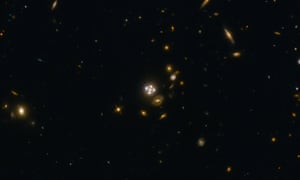The universe is expanding faster than we thought, causing problems for cosmologists. It could even mean Einstein’s theory of relativity needs revising
Its like a game of cat and mouse. Every time astronomers think they are getting close to understanding the universe, mother nature throws them another curveball to contend with.
Today’s googly comes from the H0LiCOW collaboration and takes the form of a faster than expected expansion rate for the universe. Based on new observations taken with the Hubble Space Telescope, it confirms that a serious discrepancy lies at the heart of our astronomical understanding.
The rate at which the universe is expanding is a fundamental quantity with which to test cosmological theory. It is called the Hubble Constant after Edwin Hubble, the American astronomer who first measured it in 1929.
Ways to measure Hubble’s constant fall into two camps: the study of relatively nearby celestial objects, and the study of far distant radiation left over from the origin of the universe.
Both methods should give the same expansion rate. The trouble – as confirmed today – is that they don’t.
The problem was first seen last June, when another team of astronomers known as the SH0ES project, published a surprisingly high Hubble Constant that conflicted with the value from two spacecraft: NASA’s WMAP and ESA’s Planck.
WMAP and Planck had calculated relatively slow Hubble Constants from the Universe’s microwave background radiation, which was produced during the split second in which the universe came into existence.
At the time, the astronomers were so confident with the spacecraft that they began referring to the era of ‘precision cosmology’. In their opinion, just about everything was known about the make-up of the universe, with just the astronomical ‘i’ dotting and ’t’ crossing to be done.
Today’s results, which are to be published in a series of five papers by the UK’s Royal Astronomical Society, show that there is much more to be done than the fine detail.
In a statement accompanying the results, H0LiCOW team leader Sherry Suyu, Technical University Munich Germany said, “The expansion rate of the Universe is now starting to be measured in different ways with such high precision that actual discrepancies may possibly point towards new physics beyond our current knowledge of the Universe.”
The bottom line is that the universe to almost certainly more complex than we thought – and its already byzantine. To explain other puzzling observations, cosmologists have postulated a number of substances that affect the expansion rate.
Firstly there is dark energy, which is designed to accelerate the expansion of the universe. Maybe these new observations suggest that it is growing in strength.
Secondly, there is dark matter. Despite suspecting its existence for decades now, astronomers and physicists are no closer to detecting a single particle of the stuff. Could it be behaving in a way that affects the expansion?
Thirdly, could there be a kind of dark radiation? This would invisibly carry energy around the cosmos, altering the expansion.
Fourthly, could there be a problem with Einstein’s general theory of relativity? This is the mathematical framework that astronomers use to calculate Hubble’s Constant based on the matter and energy contained in space. If those equations are even slightly off, then we could have everything else right and still be getting the wrong answer.
As yet no one knows which is the more likely solution.
Today’s results confirm that what started as a niggle has grown into a full-blown problem for cosmology. Put simply, our picture of the Universe does not add up and that means there is probably something fundamental we have not yet understood.
This is a good thing. The potential for discovery is huge. Exciting times are ahead.

No comments:
Post a Comment